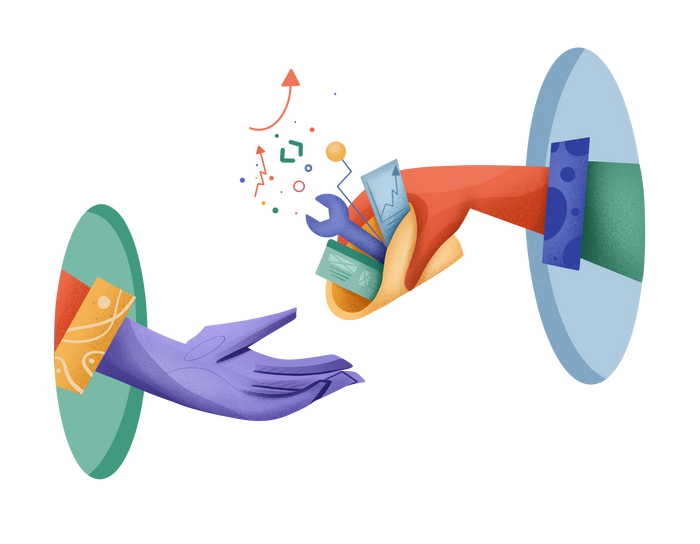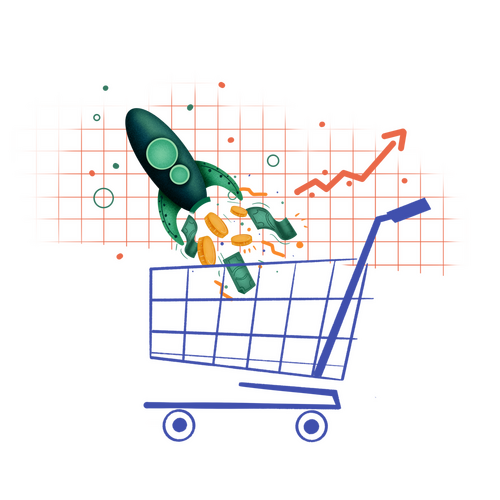Congratulations! If you manage an e-store on Shopify, or any other platform, by asking that question you’ve taken the first step towards enhancing your business.
Just the mere act of asking is a step towards positive transformation for your company, your customers, and you.
So, do you need a Customer Relationship Management (CRM) software for your e-commerce store?
The simple answer is: yes. You do need to have CRM for your e-store. It’s point-blank the easiest way to manage your company’s interactions with both existing and potential clients. Let’s take a deeper dive to understand why.

First Things First: What is a CRM?
Salesforce, one of the leaders in customer relationship management, defines CRM as “a technology used to manage interactions with customers and potential customers.”
Broadly speaking, it’s anything you use to manage your relationships with customers. In ye old-timey land, it was mailed newsletters and bulletins, a Rolodex, a customer address book, and/or a filing cabinet.
For most business, especially online business, it’s a bit different these days.
A modern CRM system is designed to build relationships between business and user, making the process simple and straightforward on BOTH ends. It’s driven by communication.
The goal is to improve customer service and brand loyalty and ultimately increase sales and profits. Muy importante, don’t you think? Customers. Are. Everything.
Hubspot, another leader in the field and a much-beloved partner of ours, reaffirms that for most businesses, their most valuable and important asset is their customers. As your business grows, it becomes more and more critical to have all of your customer information in one centralized place that can be easily accessed and leveraged for maximum impact. (Big, big emphasis on centralized.)

How Important is a CRM for an E-store?
A CRM system creates a single “customer view” of someone coming to your store, buying what they want, looking around at other things that interest them, and creating a comprehensive profile of them. Sounds a bit creepy from a customer perspective, but isn’t—if you use the data right. After all, good marketing and sales is about connecting people with products and services they want or need, right?
This 360-degree view will give an overview of your customer’s habits, interests, actions, and trepidations or objections, if any. It helps you understand them better—what are their challenges? And, in turn, how can you help them?
In the world of eCommerce, there are two different ways of approaching sales: omnichannel and multichannel. Both of them are driven by communication, which is where your CRM comes in.
Shopify explains it well in this article, but we’ll summarize it even more briefly here:
- Multichannel revolves around your product.
- This approach lets the customers engage with and purchase your product on whatever platform they prefer—Amazon, your website, buyable pins on Pinterest, a retail store, etc. The various sales channels are treated independently from one another.
- Omnichannel revolves around the customer.
- This approach focuses on creating a single customer experience across your brand. Per Shopify, “Customers can purchase wherever they are—rather than treating channels as independent silos, omnichannel accounts for the spillover between channels and offers customer experiences within and between channels.”
If you’d like to see a detailed breakdown of how each step of the buying process breaks down under either approach, definitely check out that article.
Regardless of the approach you choose, having a CRM system helps you craft a streamlined user experience that connects customers with the products and services they want and need.
It also provides you critical information on your customer behavior, so you can learn how to improve and refine your operations to be more of what they want.
Additional positive outcomes that emerge from having a CRM system implemented to your e-store include:
- Enhance sales productivity and profitability
- Improve customer satisfaction
- Improve customer retention
- Greater efficiency
- Insightful analytics and reporting

Five of the Most Popular CRM Systems
There are a LOT of CRM systems for e-commerce out there. Here are some of the best:
HubSpot
HubSpot CRM is one of the industry favorites, and it’s easy to see why. It’s an easy-to-learn robust CRM platform that offers a wide range of integrations. You can take the entire customer journey with your client from start to finish within HubSpot, making it a definitive product in the CRM space. BONUS: it’s completely free!
Zoho
From its humble beginnings as a tool to assist small to medium business, Zoho has scaled by leaps and bounds. It offers multiple integrations with e-commerce tools such as MailChimp, as well as its own extensive suite of apps. It allows for the monitoring of customer accounts and features a built-in “Opportunity Tracker.”
Metrilo
Metrilo is a CRM tool specifically geared towards e-commerce. It specifically focuses on behavior tracking and product performance, and offers a lot of rich reporting options to help you make data-driven decisions.
Salesforce
Salesforce is perhaps one of the most popular CRM systems in the world, and has been for some years. It integrates with zillions of different software, is easy to set up, has multiple deployment modes, and works fantastically on mobile too. While it may seem like a product for enterprise-level only businesses, many small business owners use it successfully as well.
AgileCRM
As a general-use CRM, AgileCRM does wonders in Shopify. It offers visitors engagement through personalized pop-ups, and builds on your already-existing customer profiles by adding in social media profiles.

Full disclosure: at Tako, we’re dedicated users of Hubspot (with a Zendesk integration). If you’d like to contact us, we’d be happy to tell you why we love it so much.
However, what’s most important is finding a CRM system that meets your unique needs and addresses the challenges that are preventing your growth. Don’t let the initial research turn you off—a CRM is that critical.
Good luck, and happy (relationship) building!

















